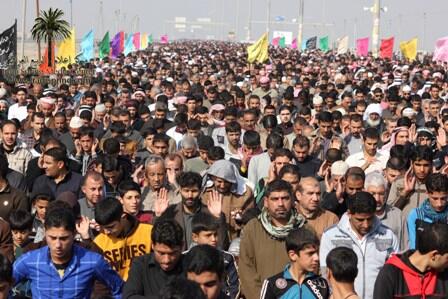That's Falluja's Friday demonstration. Only one city in Iraq holding a demonstration -- part of the ongoing protests that kicked off December 21st.
It's been almost a year and the protesters haven't given up.
How are their actions not news?
They've continued to protest despite multiple attacks on them by Prime Minister Nouri al-Maliki's forces, the worst being the April 23rd massacre of a sit-in in Hawija which resulted from Nouri's federal forces storming in. Alsumaria noted Kirkuk's Department of Health (Hawija is in Kirkuk) announced 50 activists have died and 110 were injured in the assault. AFP reported the death toll eventually (as some wounded died) rose to 53 dead. UNICEF noted that the dead included 8 children (twelve more were injured).
But they're demands are ignored repeatedly.
Nouri makes a few words pretending he's going to meet the demands and the foreign press (non-Iraqis) end up insisting he met their demands.
He never has.
Monday, Nickolav Mladenov, the UN Secretary-General's Special Representative to Iraq and head of the United Nations Assistance Mission in Iraq, addressed the United Nations Security Council.
Nickolay Mladenov: Protests continued in Anbar, Nineveh, Salah al-Din, Kirkuk and Diayala governorates in the form of unified Friday prayers. Compared to the past reporting period, the protests assumed a lower profile, owning in part to increased attention to the protesters' demands by newly elected local administrations. Indeed, the Anbar Governorate Council elected Sabah Karhout, a member of the Arab Iraqiya party, as its chair, and Ahmed Khalif al-Dulaimi, a member of the Muttahidoun party, as Governor. In Ninewa, the Governorate Council re-elected Atheel al-Nujaifi, a known supporter of the protestors and brother of the Speake of the Council of Representatives [Osama al-Nujaifi], as Governor. On 5 October dialogue between the Government and the protestors resumed following a meeting between the Prime Minister [Nouri al-Maliki] and the Governor of Anbar, who was nominated by the demonstrators to represent their interests. While the meeting was described as positive and fruitful by the Prime Minister's office, no progress has been announced to date in addressing the demonstrators' demands.
This month, the protests hit the one year mark. The protesters have been attacked, arrested and murdered.
And where is the press?
And where is the outrage?
Speaking to Patrick Cockburn (Independent) last week, cleric and movement leader Moqtada al-Sadr shared his thoughts on Nouri and the protests:
Mr Sadr is particularly critical of the government’s handling of the Sunni minority, which lost power in 2003, implying they had been marginalised and their demands ignored. He thinks that the Iraqi government lost its chance to conciliate Sunni protesters in Iraq who started demonstrating last December, asking for greater civil rights and an end to persecution.
“My personal opinion is that it is too late now to address these [Sunni] demands when the government, which is seen as a Shia government by the demonstrators, failed to meet their demands,” he said. Asked how ordinary Shia, who make up the great majority of the thousand people a month being killed by al-Qa’ida bombs, should react, Mr Sadr said: “They should understand that they are not being attacked by Sunnis. They are being attacked by extremists, they are being attacked by external powers.”
December 21st, the protests will have hit the one year mark -- that's twenty days away.
When exactly does the foreign press plan to pay attention?
 اعلام الربيع العراقي
اعلام الربيع العراقي
